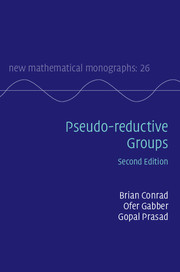Book contents
- Frontmatter
- Dedication
- Contents
- Preface to the second edition
- Introduction
- Terminology, conventions, and notation
- PART I Constructions, examples, and structure theory
- PART II Standard presentations and their applications
- PART III General classification and applications
- PART IV Appendices
- A Background in linear algebraic groups
- B Tits' work on unipotent groups in nonzero characteristic
- C Rational conjugacy and relative root systems
- References
- Index
A - Background in linear algebraic groups
from PART IV - Appendices
Published online by Cambridge University Press: 05 June 2015
- Frontmatter
- Dedication
- Contents
- Preface to the second edition
- Introduction
- Terminology, conventions, and notation
- PART I Constructions, examples, and structure theory
- PART II Standard presentations and their applications
- PART III General classification and applications
- PART IV Appendices
- A Background in linear algebraic groups
- B Tits' work on unipotent groups in nonzero characteristic
- C Rational conjugacy and relative root systems
- References
- Index
Summary
We assume the reader is familiar with the general theory of linear algebraic groups over a field, as well as with the special features of the connected reductive case over a field. More specifically, the book of Borel [Bo2] covers much of this background. However, we need to use non-smooth groups, and some definitions of common notions (such as unipotence, quotient, etc.) in [Bo2] in the smooth case need to be modified to work more generally. To avoid any confusion, in §A.1 we review a number of important definitions from the scheme-theoretic point of view that is necessary in our work; in general we follow [SGA3]. As an additional convenience to the reader, in §A.2 we record some facts from [Bo2] that we frequently apply, incorporating generalizations without smoothness hypotheses (since we need such generality).
In §A.3 we review the relative Frobenius morphism and discuss some results for non-affine groups (mainly for justifying a few examples); non-affine groups can be ignored for the development of the theory of pseudo-reductive groups. In §A.4 we record versions of the Existence, Isomorphism, and Isogeny Theorems for split connected reductive groups over an arbitrary field (since the literature on this topic aside from [SGA3] appears to always assume the ground field is algebraically closed). We also show how to deduce these results from the more well-known case of an algebraically closed ground field. The case of an arbitrary separably closed ground field arises often in our work.
Within the theory of linear algebraic groups, Weil restriction through a finite separable field extension is an important and widely used operation. Less familiar, but ubiquitous in our work, is the case of an inseparable finite extension of fields. In §A.5 we review the Weil restriction functor in a general setting, and an interesting example concerning Levi subgroups (and a variant on Weil restriction due to Greenberg) is the focus of attention in §A.6. In §A.7 we address the interaction of Weil restriction and Lie algebras.
- Type
- Chapter
- Information
- Pseudo-reductive Groups , pp. 465 - 560Publisher: Cambridge University PressPrint publication year: 2015



